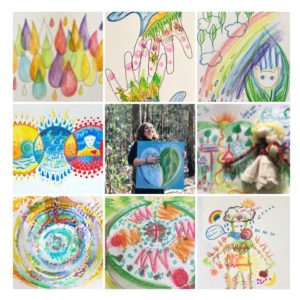What is Art Therapy

ART THERAPY is a form of psychotherapy involving the encouragement of free self-expression through painting, drawing, or modelling, used as a remedial or diagnostic activity.
Art Therapy supports mental health, mentalisation and wellbeing through a bottom up approach that speaks particularly well to those who find expression, movement and creativity a more effective form of communication than finding words or processing emotions through directives.
Art therapy may focus on the creative art-making process itself, as therapy, or on the analysis of expression gained through an exchange of a client and therapist interaction in a client led, relational manner.
Art therapy involves the use of creative techniques to help people express themselves creatively and examine the psychological and emotional undertones in their art.
With the guidance of a credentialed and registered art therapist, clients can “decode” the nonverbal messages, symbols, and metaphors often found in these art forms, which should lead to a better understanding of their feelings so they can make meaning and insights from their experience.
When it is used
Art therapy helps children, adolescents, and adults explore their emotions, improve self-esteem, manage addictions, relieve stress, improve symptoms of anxiety and depression, and cope with a physical illness or disability. No artistic talent is necessary for art therapy to succeed, because the therapeutic process is not about the artistic value of the work, but rather about finding associations between the creative choices made and a client’s inner life.
What to expect
As with any form of therapy, our first session will consist of you talking about why you want to find help and learning what I can offer. Together, we will work relationally using different materials and modalities relevant to how you are presenting or feeling at the time. Once you begin creating, I may, at times, simply observe your process as your work, without interference or judgment. When you have finished a piece of artwork—and sometimes while you are still working on it—I will ask you questions along the lines of how you feel about the artistic process, what was easy or difficult about creating your artwork, and what thoughts or memories you may have had while you were working. Generally, I will ask about your experience and feelings before providing any observations.
How it works
Art therapy is founded on the belief that self-expression through artistic creation has therapeutic value for those who are healing or seeking deeper understanding of themselves and their personalities. According to the American Art Therapy Association, art therapists are trained to understand the roles that colour, texture, and various art media can play in the therapeutic process and how these tools can help reveal one’s thoughts, feelings, and psychological disposition. Art therapy integrates psychotherapy and some form of visual arts as a specific, stand-alone form of therapy, but it is also used in combination with other types of therapy.
Source: https://www.psychologytoday.com/au/therapy-types/art-therapy
Art therapy is…
✔️ A safe person centred space to explore at your own pace, making your own choices, companioned & contained by a registered art psychotherapist
✔️ A creative & curious way to experience different materials, self expression & discover parts of self
✔️ A non deficit & strengths based model focusing on authenticity & positive identity
✔️ An inclusive & collaborative approach to celebrating your feelings, passions, interests, supports & reflect upon loves
✔️ A means to have you voice heard & safely held whilst developing upon insights, values & personal expansion
✔️ A pathway towards tapping into the wisdom of yourself & others, creating your own self toolbox to traverse through life & daily tasks
✔️ Art therapy finds your glimmers, satisfies sensory needs, sparks joy & fosters hope
✔️ About pride, acceptance, understanding, self advocacy & support
✔️ Supports psychoeducation around positive mentalisation and managing relationships, rejection sensitivity & threat responses
✖️Art therapy is NOT an art class.
✖️Art therapy does NOT require a plan. or idea of what to do prior to the session
✖️Art therapy is NOT about the final product.
✖️Art therapy is NOT for others’ interpretation.
✖️Art therapy should NOT be facilitated by anyone without the minimum qualifications.
✖️Art therapy does NOT require any previous art experience.
✖️Art therapy is NOT corrective or a ‘behavioural’ or ‘social skills’ lesson.
✖️Art therapy is NOT a ‘teacher/student’ relationship.